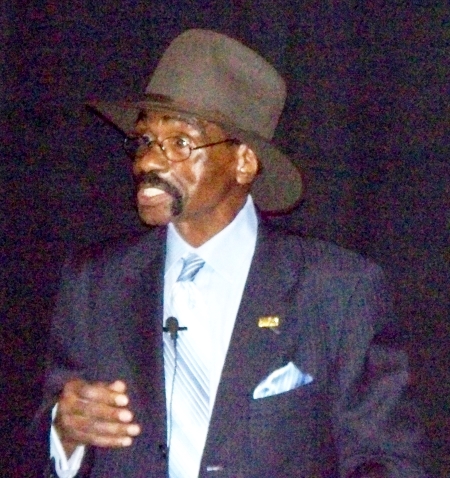“Hurricane” Rubin Carter and his parallels to George Floyd

Michael Borkson on CreativeCommons.org
Boxer “Hurricane” Rubin Carter, who’s unjust imprisonment in 1966 draws many similarities to the murder of George Floyd.
As the trial of Derek Chauvin is about to begin, we should take this time to remember that George Floyd was far from the first Black person to have their civil rights trampled on and certainly not the first to have been unjustly killed by a police officer. While you have heard about the recent murders of Floyd and Breonna Taylor and the less recent murder of Trayvon Martin, you have probably not heard the story of “Hurricane” Rubin Carter.
In 1966, middleweight boxer “Hurricane” Rubin Carter was arrested for the murder of three people at the Lafayette Bar & Grill in Paterson, New Jersey. During the trial, the state’s only witnesses were Alfred Bello and Arthur D. Bradley, who alleged they saw Carter and John Artis walking out of Lafayette holding a shotgun and a pistol before driving away in a white car. Bello admitted he was there as a lookout for Bradley, who was breaking into a nearby warehouse. Bello also stole money from Lafayette’s register as three people lay dead on the floor.
How any reasonable human being could think these two men were credible witnesses is beyond me. It was later revealed that both Bello and Bradley received money and a reduced sentence for testifying against Carter and Artis. Beyond that, there was no evidence connecting Carter and Artis to the triple murder, as the weapons were never found and the two survivors of the murders, Hazel Tanis and Willie Marins, did not identify Artis or Carter. Yet both were convicted of triple murder on June 29, 1967 and sentenced to three life sentences.
Carter and this case received widespread attention and support, with legendary boxer Muhammad Ali joining the fight to release him from prison alongside numerous civil rights leaders. After visiting him in prison, singer/songwriter Bob Dylan wrote the song “Hurricane,” detailing Carter’s unfair trial and imprisonment. Dylan also included the song on his 1976 album “Desire.”
Eventually, after years of litigation, Rubin Carter was released from prison in November 1985 at 48 years old. Artis had been released in 1981 on parole.
On the surface, there are many similarities between Rubin Carter and George Floyd; both were accused of a crime and decided guilty by police officers based on no evidence. There is one obvious difference, however: George Floyd was murdered. George Floyd did not get a trial. George Floyd did not get a jury of his peers — just when this American citizen needed his rights the most, they were taken away. What was the alleged crime he was murdered for? Using a counterfeit $20 bill.
If you have not listened to Bob Dylan’s “Hurricane,” you owe it to yourself to give it a listen. It spreads awareness of the plight of “Hurricane” Rubin Carter, who lost 17 years of his life for a crime he did not commit. His struggle is echoed in the murder of George Floyd, both having been denied justice, all because of the color of their skin. As Bob Dylan wrote in the song, we should all be “ashamed to live in a land where justice is a game.”

Luke Brennan is the Editor-in-Chief of The Hawks' Herald, previously serving as Managing Editor (2021-2022), Opinions Editor (2020-2021) and as a...





